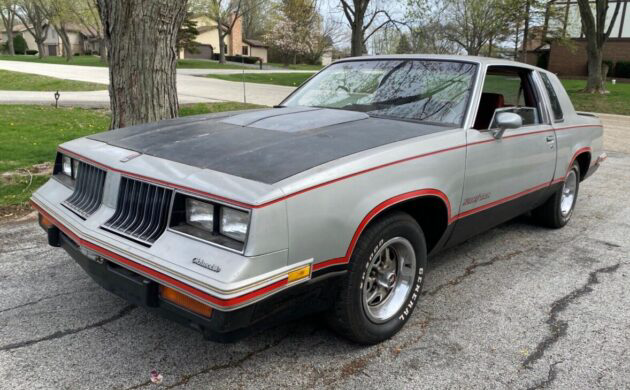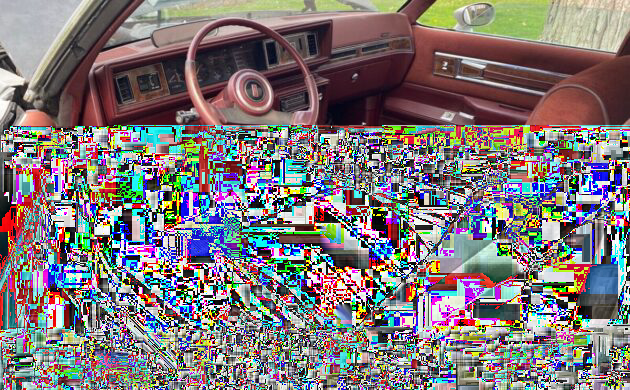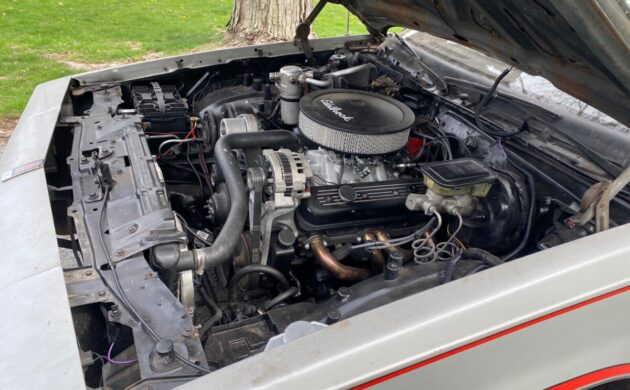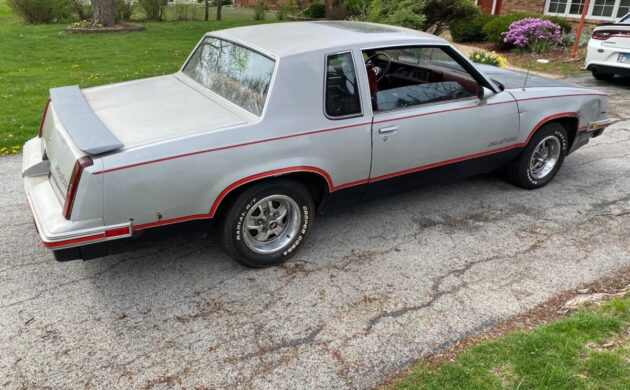Lightning Rods: 1984 Hurst/Olds Project Driver
The first Hurst Olds was produced in 1968 and the last one was offered in 1984. In between, several models were offered in the 1960’s, 1970’s and 1980’s. This example is a 1984 Hurst Olds that is in need of restoration. It is located in Olympia Fields, Illinois and is listed here on eBay. It is currently bid to $6,500 with 3 days remaining in the auction. The reserve has not been met. This 1984 model is equipped with air conditioning, cruise control, tilt steering, power windows and power locks. Of course, the car has its original Hurst Lightening shifter that was used in 1983 and 1984.
The car is reported to have 84k miles on the odometer but the title check on eBay shows that might not be accurate. The last odometer reporting was in 1997 at 80,000 miles. There is also a past issue with the title. The interior is worn and the rearview mirror is sitting on the dash. The seats are missing some hardware and the carpet is soiled. But, the lightning rod shifter is in place and a new crate engine has been recently installed! The seller states that a new exhaust system is needed. The correct Hurst/Olds hood bulge is there but the body could use paint and there are a few rust spots.
While the engine in this example has been replaced, all Hurst Olds vehicles were originally equipped with the LG8 5.0-liter 307 cubic inch V8 engine that sent power to 3.73 rear gears and exited the spent engine fumes through dual exhaust. The LG8 engine had a horsepower rating of 180 hp which was significantly higher than the base LG4 305 cubic inch GM V8. It could accelerate from 0 to 60 mph in approximately 8.5 seconds. Quarter-mile times were reported to be in the mid-16 second range according to car magazine tests of the day.
Looking back, this may not have been the fastest car but it was certainly attractive and Oldsmobile did more than just put some decals on it. The fuel efficiency of the Hurst Olds is respectable for a 1980’s car with EPA ratings of 17 mpg in the city and 27 mpg on the highway. The good highway mileage is due to the 200R 4-speed automatic transmission that provided overdrive. In the final two years of production for the Hurst Olds, the 1983 and 1984 Hurst Olds looked the same with a power bulge hood and chrome rally wheels but that the 1983 model was painted in black with silver accent and the 1984 model was painted silver with black accents.
Auctions Ending Soon
 2002 Subaru Impreza WRXBid Now1 days$333
2002 Subaru Impreza WRXBid Now1 days$333
 1975 Chevrolet Corvette ConvertibleBid Now1 days$4,000
1975 Chevrolet Corvette ConvertibleBid Now1 days$4,000
 1964 Ford F-100 Camper CustomBid Now1 days$2,000
1964 Ford F-100 Camper CustomBid Now1 days$2,000
 2006 Jeep Wrangler SportBid Now3 days$11,000
2006 Jeep Wrangler SportBid Now3 days$11,000
 1974 Datsun 260ZBid Now5 days$750
1974 Datsun 260ZBid Now5 days$750





Comments
I had the “Lighting Rod Shifter” I bought from Summit in my 71 GS, worked great for drag racing. Now they are very hard to find, and pricey
To much missing and NOM.
Sadly
6k maybe 7k tops. When it comes home and you get digging. It’s going to quickly become a money pit. Especially at 80000 miles. That was about max mileage back then before everything falls apart. YES plastic is forever unless it’s in car form.
These plastic disposable disco cars are really not a “investment”
My friend in high school had a brand new 84 H/O, and I remember it wasn’t very fast, but the shift kit in the transmission would snap your neck. Even back then, being brand new, it still didn’t fool anyone that had a late 60s early 70s Nova/Chevelle/Mustang etc. with a V8, headers, and decent intake and carb.
The first question I have to ask is: Why was the engine replaced? The second question is: What engine did the owner replace it with? By 1984, some form of electronic fuel injection, either Throttle Body Injection (TBI) or Tuned Port Injection (TPI) was standard equipment in most cars. Yet the replacement motor seems to have a four-barrel carburetor sitting atop an aftermarket aluminum intake manifold, yet another reason why I ask what motor is installed in the car now? Until I know why the motor was replaced and what motor replaced it, I’ll pass, which is a shame, because despite its faults, it seems like a clean, straight, rust-free example that wouldn’t take a lot of work to make it shine like a jewel, including buffing out the oxidized paint and repairing the interior.
The 307 that came in H/O had a “feed back” carburetor.
The 1984 Hurst Olds was my first car. The four barrel was a Rochester and it sat on an aluminum intake. Geared.that low, the car would leave black marks when it hit second gear. A lot of great memories. It also had a Clarion sound system which, for the day, wasn’t too bad.
Those feedback carburetors were a nightmare to tune or repair, and often never ran right from day one. So step one in the drivability department would be to toss that carburetor into the nearest scrap metal bin, and replace it with either a TBI or TPI setup.